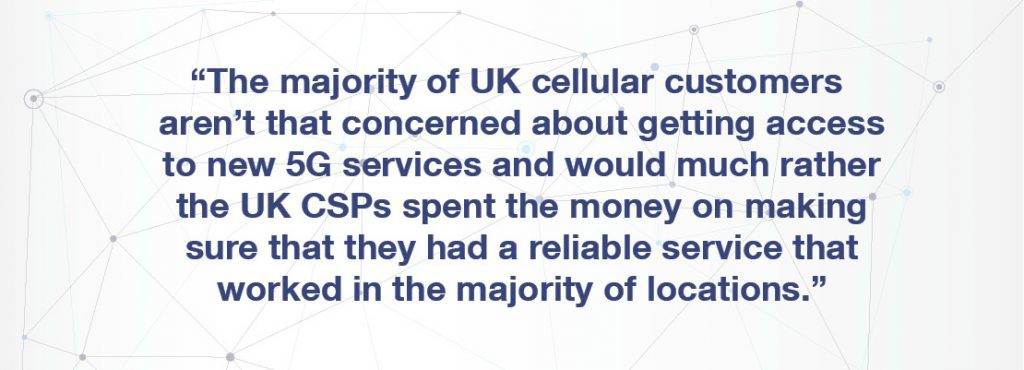The UK Government has made its long-trailed decision on the involvement of Huawei in UK comms networks – and the answer was… ‘no thanks!’.
There has been an awful lot of opinion, reportage and hype on this topic over the last year, and almost all of it has highlighted the negative aspects of the decision, in fact some of it has bordered on the apocalyptic – ‘phone users face blackouts if Huawei removed from networks’ and “it would be highly disruptive for our users” to quote one major cellular operator.
We’re not sure it’s quite as bad as that…
Huawei have grown significantly in the last 20 years and have achieved a dominant position in both fixed line and cellular networks all round the world, which has led to many telecoms providers relying on Huawei for not only the provision of network equipment but also the operation of those networks and this might be where some of the more apocalyptic predictions are coming from.
It’s one thing to mandate that an operator removes equipment from a supplier from their network, it’s another thing to force that operator as a consequence, to change the arrangements they have in place for maintaining that network – put simply, for some operators, if Huawei kit is removed, they’ll need to re-employ all the engineers they let go of when Huawei took over the maintenance of the network or find someone else to do so.
Telecoms equipment vendors wouldn’t say this themselves, but they’re all very similar – the base station radios, Home Subscriber Servers, User Plane Functions and other 4G and 5G network devices that Cellular Service Providers (CSP’s) purchase from Huawei can also be purchased from Nokia, Ericsson, Samsung, et al. CSPs maintain that Huawei are a year or more ahead of their competitors in terms of the quality and functionality of their ‘core’ network equipment and this may or may not actually be true, but even if it is, will the average UK cellular consumer going to notice if ‘network slicing’ (which is one of the few things that a 5G network can do that a 4G network can’t) takes an extra year to arrive? – we’d argue they wouldn’t.
In fact, we’d go further and say that the majority of UK cellular customers aren’t particularly concerned about getting access to new 5G services and would much rather the UK CSPs spent the money on making sure that they had a reliable service that worked in the majority of locations – people living in “not-spots” don’t really care if it’s a 4G or a 5G service that they’re not getting.
Even if access to faster 5G radio services is something that the UK consumers crave, the provision of 5G radio access is decoupled from the provision of 5G core network services – 5G can (and currently does) work almost as effectively when plugged into a 4G network. The government’s overriding concern is with Huawei having access to the ‘core’ of 5G networks (although they’ve also stated that Huawei should be removed from the radio access part of the network eventually) and the 5G core networks aren’t operational yet, so the impact in barring Huawei (at least as far as 5G is concerned) is less about engineering and more about planning, purchasing and economic issues at the moment, rather than a ‘touring the country ripping out existing kit’ issue.

If we take a wider perspective of a total ban on the use of Huawei in any part of any UK terrestrial and cellular networks, then there will be a lot of equipment that will have to be replaced, but with a 5 or 6 year window in which to make the replacements, much of that kit would have reached “end of life” and been removed and renewed within that time frame anyway, so again it’s more of a planning, purchasing and economic issue all of which can be easily addressed.
Whether you give any credence to the conspiracy theories (about Huawei’s links to Chinese intelligence services or about 5G itself), we personally don’t believe that it would make a huge difference to the UK economy or the lives of UK residents if the network operators were forced to choose from other vendors – in fact, there’s an argument to say that it’s in European operators’ best interests to give more work to Europe-based vendors like Ericsson and Nokia, but that might be too much of a protectionist attitude for many to accept. There is however a strong case for there being an indigenous European telecoms equipment manufacturing capability, after all it is part of our Critical National Infrastructure. Sadly, the demise of Marconi, when they were excluded from the core network build tender of the UK’s national network 20 years ago left the UK without an indigenous manufacturer and effectively opened the door to Huawei.
The bottom line is that if Huawei are banned from UK networks there are plenty (well, a few) alternative vendors with equipment that delivers more the less the same performance at comparable prices, just waiting to be used instead. In summary, UK consumers, politicians, journalists, network operators and everyone else should take heed of the words of the philosopher and sage Douglas Adams, emblazoned on the cover of the Hitchhikers Guide to the Galaxy – Don’t Panic!
About the Authors
Joe Hoy, Director Product Lifecycle, Forensic Analytics – is a globally respected expert in cellular networks, he is an engineer who has worked on most of the networks in the UK and digital forensics practitioner. Joe is also the author of the set text Forensic Radio Survey Techniques for Cell Site Analysis used widely amongst the law enforcement agencies including the FBI’s training school at Quantico. Joe is one of the founders of Forensic Analytics.
Steve Rick, Managing Director, Forensic Analytics – is an engineer with over 30 years, experience in international IT and Telecoms. Steve led the design and build of one of the UK’s largest fixed line, terrestrial next generation, fibre optic networks as the MD of Network and Operations at Easynet. A network that provides the backbone for most of the UK’s fixed line carriers.
©Forensic Analytics 2020




